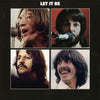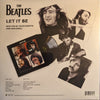



The Beatles - Let It Be (New Stereo Mix, Half Speed Mastering)
The Beatles [click here to see more vinyl featuring The Beatles]:
- John Lennon - Lead and backing vocals, rhythm guitar, lead guitar on "Get Back", lap steel guitar on "For You Blue", acoustic guitar on "Two of Us", "Across the Universe" and "Maggie Mae", six-string bass guitar on "Dig It" and "The Long and Winding Road", whistling on "Two of Us"
- Paul McCartney - Lead and backing vocals, bass guitar, acoustic guitar on "Two of Us" and "Maggie Mae", piano on "Dig It", "Across the Universe", "Let It Be", "The Long and Winding Road", and "For You Blue", Hammond organ on "I Me Mine", electric piano on "I Me Mine" and "Let It Be", maracas on "Let It Be" -
- George Harrison - Lead and rhythm guitars, acoustic guitar on "For You Blue" and "I Me Mine", tambura on "Across the Universe", lead vocals on "I Me Mine" and "For You Blue", backing vocals [click here to see more vinyl featuring George Harrison]
- Ringo Starr - Drums, maracas on "Across the Universe" [click here to see more vinyl featuring Ringo Starr]
Richard Anthony Hewson – string and brass arrangements on "I Me Mine" and "The Long and Winding Road"
John Barham – choral arrangements on "Across the Universe", "I Me Mine" and "The Long and Winding Road"
George Martin – shaker on "Dig It", string and brass arrangements on "Let It Be", production
Linda McCartney – backing vocals on "Let It Be"
Billy Preston – electric piano on "Dig a Pony", "I've Got a Feeling", "One After 909", "The Long and Winding Road" and "Get Back", Hammond organ on "Dig It" and "Let It Be"
Brian Rogers – string and brass arrangements on "Across the Universe"
Written by John Lennon, Paul McCartney (A1-A3, A6, B1-B3, B5), George Harrison (A4, B4), George Harrison, John Lennon, Paul McCartney, Ringo Starr (A5), Traditional (A7)
1LP, standard sleeve
Original analog Master tape : YES
Heavy Press : 180g
Record color : black
Speed : 33 RPM
Size : 12'’
Stereo
Studio
Record Press : Capitol Records Pressing Plant, Los Angeles
Label : Capitol
Original Label : Apple Records
Recorded 4, 8 February 1968 ; 24–31 January 1969 ; 3, 4, 8 January 1970 ; 1 April 1970 at Apple, EMI and Olympic Sound, London
Engineered by Glyn Johns
Mixed by Giles Martin & Sam Okell
Produced by George Martin, Phil Spector
Originally released in May 1970
Reissued in 2024
Tracks:
Side A:
1. Two Of Us
2. Dig A Pony
3. Across The Universe
4. I Me Mine
5. Dig It
6. Let It Be
7. Maggie Mae
Side B:
1. I’ve Got A Feeling
2. One After 909
3. The Long And Winding Road
4. For You Blue
5. Get Back
Awards:
Rolling Stone 500 Greatest Albums of All Time - Ranked 342
Colin Larkin's All Time Top 1000 Albums – Ranked 890
1971 Grammy Award for the Best Original Score Written for a Motion Picture or Television Special
Academy Award for the Best Original Song Score for Let It Be
Reviews :
"The only Beatles album to occasion negative, even hostile reviews, there are few other rock records as controversial as Let It Be. First off, several facts need to be explained: although released in May 1970, this was not their final album, but largely recorded in early 1969, way before Abbey Road. Phil Spector was enlisted in early 1970 to do some post-production work, but did not work with the band as a unit, as George Martin and Glyn Johns had on the sessions themselves; Spector's work was limited to mixing and some overdubs. And, although his use of strings has generated much criticism, by and large he left the original performances to stand as is: only "The Long and Winding Road" and (to a lesser degree) "Across the Universe" and "I Me Mine" get the wall-of-sound layers of strings and female choruses.Although most of the album, then, has a live-in-the-studio feel, the main problem was that the material wasn't uniformly strong, and that the Beatles themselves were in fairly lousy moods due to inter-group tension. All that said, the album is on the whole underrated, even discounting the fact that a sub-standard Beatles record is better than almost any other group's best work. McCartney in particular offers several gems: the gospelish "Let It Be," which has some of his best lyrics; "Get Back," one of his hardest rockers; and the melodic "The Long and Winding Road," ruined by Spector's heavy-handed overdubs (the superior string-less, choir-less version was finally released on Anthology Vol. 3). The folky "Two of Us," with John and Paul harmonizing together, was also a highlight. Most of the rest of the material, by contrast, was going through the motions to some degree, although there are some good moments of straight hard rock in "I've Got a Feeling" and "Dig a Pony." As flawed and bumpy as it is, it's an album well worth having, as when the Beatles were in top form here, they were as good as ever." AllMusic Review by Richie Unterberger.
Sourced directly from the original session and rooftop performance 8-track tapes
The Beatles have announced a reissue of Let It Be, packaging the classic 1970 album with a new stereo mix of the album as guided by the original "reproduced for disc" version by Phil Spector and sourced directly from the original session and rooftop performance 8-track tapes.
"I had always thought the original film Let It Be was pretty sad as it dealt with the break-up of our band," writes Paul McCartney in his foreword for a special edition Let It Be book included in the Super Deluxe Edition. "But the new film shows the camaraderie and love the four of us had between us. It also shows the wonderful times we had together, and combined with the newly remastered Let It Be album, stands as a powerful reminder of this time. It's how I want to remember The Beatles."
In 2017, Sgt. Pepper's Lonely Hearts Club Band was reissued for its 50th anniversary. The White Album got the same treatment the following year, and Abbey Road was reissued in 2019.
Rolling Stone calls Let It Be the Beatles' misunderstood masterpiece. The album with the band's most daunting reputation. We're all used to hearing it as their break-up album. The messy film soundtrack that arrived in May 1970, just as the band was breaking up.
But with Phil Spector taking the helm, the story of Let It Be had diamonds among shining amid its darker moments. This is the album with classics such as "Let It Be," "Across the Universe," "Get Back," and "Two of Us."
Half-speed mastering
In half-speed mastering, the whole mastering process is slowed down to half of the original speed. A typical 33 1/3 rpm record is cut at 16 2/3 rpm. The source material is also slowed down (reducing the pitch in the process) meaning the final record will still sound normal when played back. Slowing the whole process down allows more time, which means the end result sounds better and is more efficient — allowing engineering to minimize the effects of inherent limitations within the vinyl format. The result is a more accurate and more open high-frequency response in the half speed vinyl when compared with a normal speed recording.
Ratings :
AllMusic : 4.5 / 5 ; Discogs : 4.5 / 5 ; Billboard : 4 / 5 ; Chicago Sun-Times : 2.5 / 5 ; The Daily Telegraph : 2 / 5 ; Encyclopedia of Popular Music : 3 / 5 ; The Rolling Stone Album Guide : 3 / 5 ; Pitchfork : 9.1 / 10




